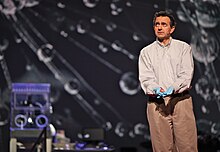Anthony Atala | |
|---|---|
 Atala in 2011 | |
| Born | July 14, 1958 |
| Alma mater | University of Miami (BS) University of Louisville (MD) |
| Occupation(s) | Professor and director of the Wake Forest Institute for Regenerative Medicine, and chair of the Department of Urology at Wake Forest School of Medicine in North Carolina |
Anthony Atala (born July 14, 1958) is an American bioengineer, urologist, and pediatric surgeon. He is the W.H. Boyce professor of urology, the founding director of the Wake Forest Institute for Regenerative Medicine, and the chair of the Department of Urology at Wake Forest School of Medicine in North Carolina.[1][2] His work focuses on the science of regenerative medicine: "a practice that aims to refurbish diseased or damaged tissue using the body's own healthy cells".[3]
Dr. Atala is the creator of the first 3D bioprinters (Integrated Tissue and Organ Printing System or ITOP) and is one of the foremost leading figures in the field of organ printing.[4][5] Atala and his team developed the first lab-grown organ (a bladder) to be implanted into a human.[6][7] He is also developing experimental technology that can 3D print human tissue on demand.[8]
As director of the Wake Forest Institute for Regenerative Medicine, Dr. Atala leads a team of more than 400 researchers dedicated to developing cell therapies and engineering replacement tissues and organs for more than 40 different areas of the body.[2]
Dr. Atala is editor of 3 journals and 25 books including Principles of Regenerative Medicine, Foundations of Regenerative Medicine, Methods of Tissue Engineering and Minimally Invasive Urology.[2] He has published over 800 journal articles and has received more than 250 national and international patents. Fifteen technology applications developed in Dr. Atala's laboratory have been used clinically.[9]
He serves on the editorial board of the scientific journal Rejuvenation Research,[10] on the national board of advisors for High Point University[11] and on the SENS Research Foundation's research advisory board.[12] He is a founding member of the Tissue Engineering and Regenerative Medicine International Society (TERMIS) from which he received the Lifetime Achievement Award. Atala is the director of the Armed Forces Institute of Regenerative Medicine, a federally funded institute created to apply regenerative medicine.[2]
- ^ "Anthony Atala, MD, Professor and Director - WFIRM". wfirm.org. Retrieved September 28, 2017.
- ^ a b c d "Wake Forest Innovations. Our Experts: Anthony Atala". Wakeforestinnovations. Archived from the original on September 19, 2020.
- ^ "Scientist at Work: Anthony Atala. A Tissue Engineer Sows Cells and Grows Organs". Archived from the original on May 25, 2017. Retrieved September 28, 2017.
- ^ "Need a New Organ? Surgeon Anthony Atala Sees a Future Where You Can Simply Print It Out". Smithsonianmag. Archived from the original on November 18, 2016.
- ^ "Facilitating 3D Organ Printing with Plant-Based BioInks". Pharma's Almanac. 2016. Archived from the original on March 20, 2020.
- ^ "Lab-grown bladders 'a milestone'". April 3, 2006. Retrieved September 28, 2017 – via news.bbc.co.uk.
- ^ Atala A, Bauer SB, Soker S, Yoo JJ, Retik AB (April 2006). "Tissue-engineered autologous bladders for patients needing cystoplasty". Lancet. 367 (9518): 1241–6. doi:10.1016/S0140-6736(06)68438-9. PMID 16631879. S2CID 17892321.
- ^ "Anthony Atala: Surgeon". Ted. Archived from the original on March 16, 2014.
- ^ "Anthony Atala, MD. Professor, Urology. Wake Forest Institute for Regenerative Medicine". Wakehealth. Archived from the original on February 8, 2019.
- ^ "Rejuvenation Research. Editorial Board". Mary Ann Liebert. Retrieved November 17, 2014.
- ^ "High Point University National Board of Advisors".
- ^ SENS Research Foundation Research Advisory Board